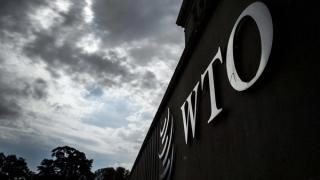The WTO has long been a central element of US economic statecraft. However, President Donald Trump’s trade war and the pandemic have shifted attitudes to economic interdependence in both the US and China.
In the twenty years since China’s accession to the World Trade Organization (WTO) on 11 December 2001, China’s role in the world economy has grown enormously, but has also become more contested. In the US, Republican presidential hopeful Marco Rubio gave a speech on 8 December declaring that China’s formal entry into the multilateral trading system meant that “American industry suffered, working families were left behind and China rose to become an authoritarian adversary on the global stage.” China’s integration into the world economy is thought by many to have inflicted a negative shock to the US economy that fed the rise of populist politics.
The decision to grant China permanent normal trade relations in 1999, which took effect with China’s accession to the WTO in 2001, made permanent China’s most-favoured-nation (MFN) status that had previously been the subject of an annual grant by US Congress since 1980. WTO accession did not grant China access to US markets it did not already enjoy, although it did eliminate the uncertainty that accompanied the annual renewal of its MFN status.
China has selectively embraced the rules and norms of the international trading system, but creeping protectionism among G20 economies since the global financial crisis in 2008 demonstrates that the problems in the multilateral trading system are far more general in nature, and are not specific to China.
According to one estimate, the reduced uncertainty accounted for one-third of China’s export growth to the US from 2000 to 2005, lowered US prices, and increased consumers’ income by the equivalent of a 13-percentage-point permanent tariff decrease. But the real economic significance of WTO accession was its role in opening up and reforming the Chinese economy, including lowering its tariff barriers to the rest of the world. Reductions in Chinese tariffs on its own inputs contributed to much of the growth in Chinese exports to the US.
The “China shock” literature associated with David Autor and his co-authors has highlighted the number of US manufacturing jobs lost to import competition from China. However, a broader assessment of the economic impact of the “China shock” shows that it has been a net positive for the US economy. For example, the expansion in US exports relative to imports from China created net demand for 1.7 million jobs. The shock served to accelerate long-run secular trends in the US economy due to the globalisation of manufacturing. Had the US resisted China’s integration into the global economy, greater import competition would have almost certainly arisen from other developing economies.
Claims that US economic engagement with China failed to change China’s attitudes to global rules and norms, or change its political system in a more liberal direction, reflects a similarly partial analysis to that found in the “China shock” literature. Such claims ignore likely counterfactuals, in which a more economically isolated China would have continued to present strategic and security challenges to the US.
China has selectively embraced the rules and norms of the international trading system, but creeping protectionism among G20 economies since the global financial crisis in 2008 demonstrates that the problems in the multilateral trading system are far more general in nature, and are not specific to China. While China has taken an inward and more repressive turn under Xi Jinping, this can be attributed in part to the increased insecurity the Chinese Communist Party (CCP) feels from foreign and domestic economic influences that threaten its rule. Economic engagement was never expected to lead to top-down political liberalisation, but it was expected to lead to changes in societal demands and preferences that would present long-run challenges to CCP rule.
President Trump’s trade war, which effectively revoked China’s MFN status, has also led Chinese elites to question the extent of economic interdependence with the United States. Trump’s “America First” policies and President Joe Biden’s “foreign policy for the middle class” are mirrored in China by Xi’s advocacy of a concept of national security that embraces economic self-sufficiency, aspires to global technological leadership, engages in economic statecraft, and seeks to diversify from economic engagement with the US. Far from calling out and discipling China’s behaviour, President Trump’s trade policies — which have been maintained by the Biden administration — have encouraged China to double-down on its state-led development model and strategic industry and trade policy, while multilateral approaches to addressing China’s trade practices have been neglected and under-utilised.
Far from being a champion of globalisation, the US has increasingly disengaged from the world economy over the last twenty years, beginning with the failure of the WTO Ministerial Conference in Seattle in 1999, and culminating most dramatically in its failure to join the centrepiece of the Obama administration’s economic diplomacy, the Trans-Pacific Partnership. This retreat added impetus to a rolling deglobalisation shock following the 2008 financial crisis, and it is the associated loss of economic dynamism, more so than the “China shock,” that has bred populist political impulses in the US, and increased repression in China.
A key to restoring domestic political support for US leadership of the multilateral trading system is to reframe that leadership in terms of strategic competition with China around the rules and norms of the global economy, in addition to taking into account the economic benefits.
In the 1930s, protectionism, economic collapse, and the retreat from globalisation fed into, but largely preceded, the outbreak of geopolitical conflict in the 1940s. The rise in protectionism largely reflected domestic political imperatives, as well as policymakers balancing competing macroeconomic policy considerations, such as the exchange rate and price stability under the gold standard. US isolationism in the 1930s — which notably included its absence from key international institutions such as the League of Nations — reduced its ability to manage the deglobalisation shock and the subsequent descent into world war.
It was based on this experience that the General Agreement on Tariffs and Trade, and then the WTO, became central elements of the very successful US economic statecraft of the post-war period that consolidated the US system of security alliances alongside a rules-based global trading system.
The deglobalisation shocks from the 2008 financial crisis and the COVID-19 pandemic have also been largely independent of geopolitics in their origins. However, they have both fed into geoeconomic narratives around China’s state-led development model and its geopolitical implications. President Trump’s trade war and the pandemic have shifted elite and popular attitudes to economic interdependence in both the US and China.
A key to restoring domestic political support for US leadership of the multilateral trading system is to reframe that leadership in terms of strategic competition with China around the rules and norms of the global economy, in addition to taking into account the economic benefits. Effective US leadership of the multilateral trading system would not only promote US foreign policy objectives, but also discipline US domestic economic policy in ways that would better serve its economic interests.
The WTO provides a rules-based framework for managing trade frictions that arise from climate mitigation under the Paris Agreement. The US also has a substantial interest in protecting the digital economy, which is one of the fastest growing areas of the cross-border trade. However, the digital economy is still largely outside the scope of existing WTO rules, reflecting their origin in a pre-digital era, while China is aiming to become a “cyber great power” through its “digital silk road.”
Australia has long been a supporter of the multilateral trading system, reflecting its status as a small, open economy that is potentially vulnerable to trade discrimination by larger economies. The US-China “phase one” trade deal and recent US-EU accord on steel and aluminium trade both point to the growing risk of managed trade deals that further undermine the multilateral trading system, unless that system can be reformed to meet contemporary challenges.






